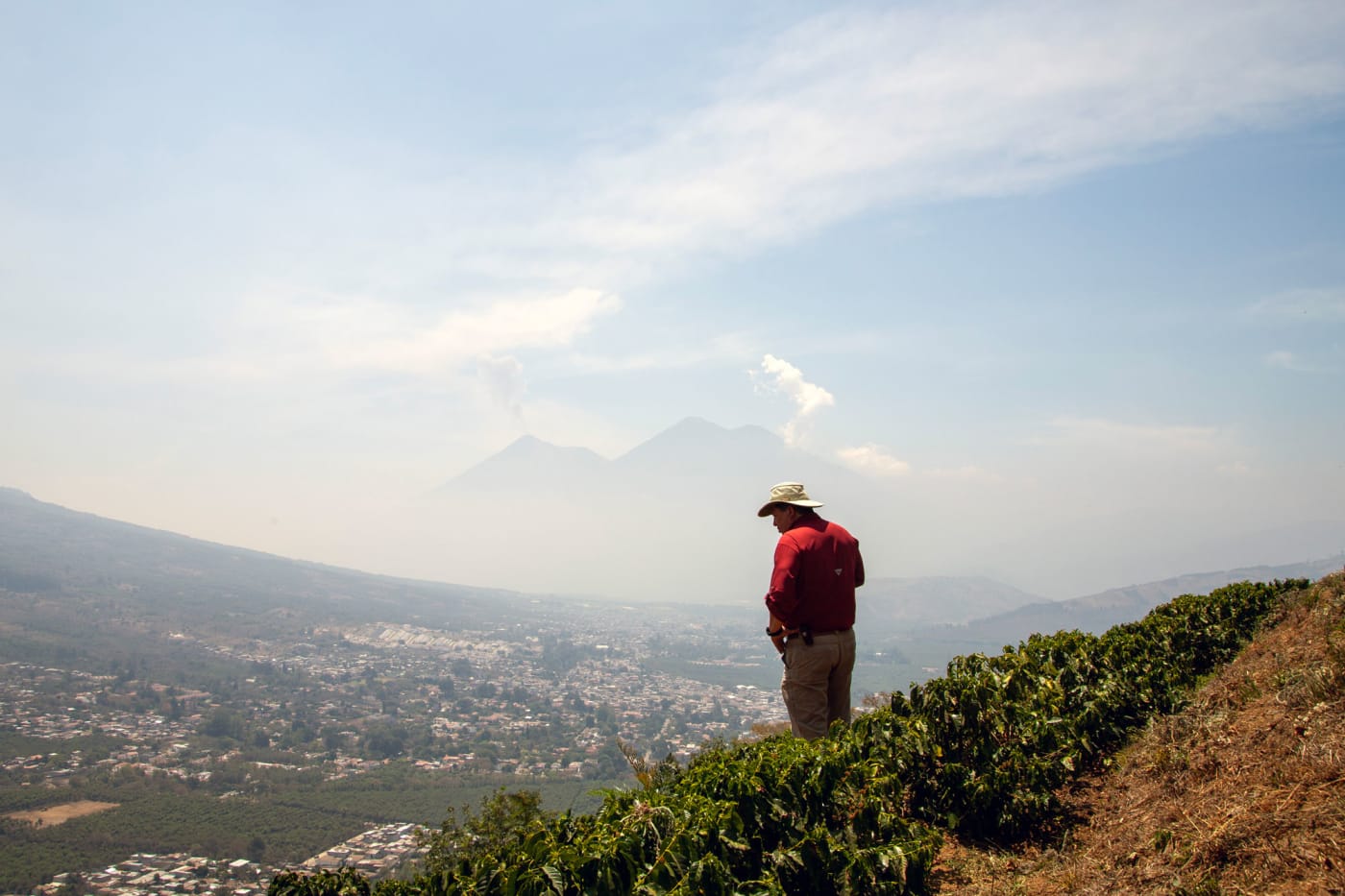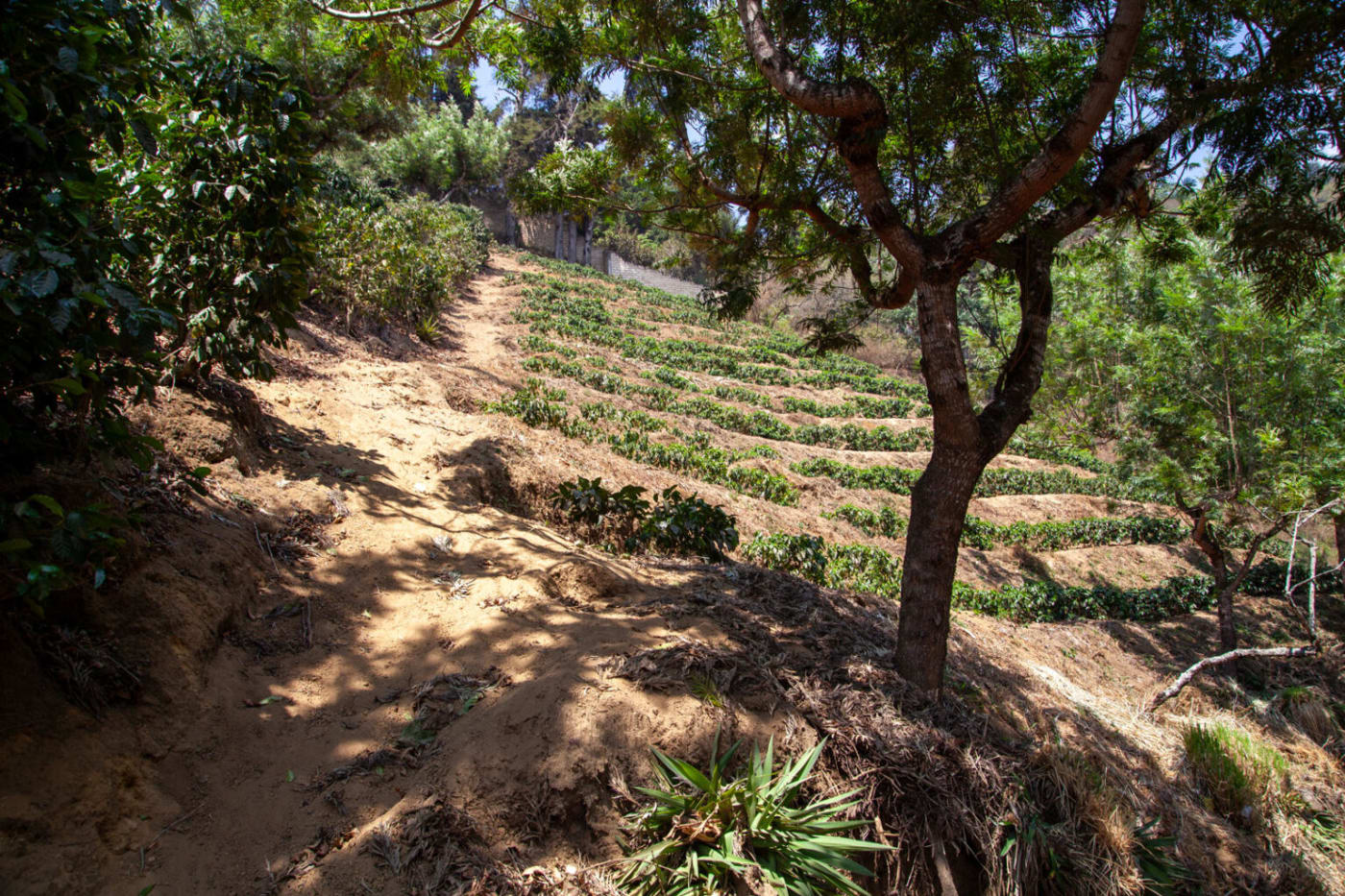-
Producer
-
Ricardo Zelaya
-
Farm/Coop
-
Santa Clara Estate
-
Country
- Guatemala
-
Region
-
Antigua
-
Altitude
-
1550 - 1890m above sea level
-
Variety
-
Process
-
Importer
-
Melbourne Coffee Merchants
-
Body
-
-
Acidity
-
-
Tasting notes
-
Frangipani, orange, blackberry
-
Roast style
Guatemala
Ricardo Zelaya
The influential Zelaya family has been growing coffee in Antigua for more than 100 years. This has led to not only an expertise in coffee growing, but also an attention to sustainability practices. In the cup, we find notes of frangipani, orange, and blackberry.
This coffee comes from Santa Clara Estate, a farm owned and managed by Ricardo Zelaya. The influential Zelaya family has been growing coffee in Antigua for more than 100 years. This renowned family owns several farms in the region, and over the last century they have worked tirelessly to uphold, refine, and elevate the reputation of in Antigua, one of Guatemala’s most celebrated and loved coffee regions.

Santa Clara Estate is ninety hectares in size and is located on the fertile southern slopes of slopes of Hunahpú Volcano (also called Agua in Spanish) in the heart of the Antigua Valley. The farm has been owned and managed since 1988 by Ricardo Zelaya, the fourth generation of the Zelaya family to have produced coffee at Santa Clara. Back then, only the lowest elevations of Santa Clara were planted with coffee. The highest parcels were for farming corn and beans for consumption, and for the cattle and horses of neighbouring Hacienda Carmona. Ricardo then made the decision to start planting coffee higher up, increasing the farm’s yields. The process has taken years, but today the farm is one of Antigua’s most productive and is well-known for the exceptional quality of its coffee.
Ricardo is a meticulous and progressive farmer who is focused on delivering the very best coffee he can. He manages three coffee farms in Antigua: Santa Clara, Hacienda Carmona and Puerta Verde, and owns and manages a farm called Carrizal in the New Oriente coffee region. His farms are scrupulously well-managed — especially when it comes to the careful selection of varietals planted. While he prefers Bourbon and Caturra for volume, Ricardo has planted also Gesha, Pacamara, Villa Sarchi, Pacas and San Francisco to be able to offer differentiated microdots.

Because Antigua’s climate can be quite dry, careful attention is given to plant nutrition and pruning. Since they were first planted in the late 80s, plots that lie at the farm’s higher elevations have needed some form of irrigation. Over the years, Ricardo has trialled with both sprinkler and drip systems, and has discovered that a drip system is more efficient way to ensure the plants adequately hydrated. While this has been a significant investment for the family, they recognise that it’s the most sustainable way to ensure Santa Clara Estate remains productive well into the future.
Ricardo is also passionate about sustainability. Twenty-five hectares of the estate are dedicated to natural reserve, and all of the coffee is shade-grown, which protects the plants from direct sunlight, maintains soil health, and provides an important habitat for birds and insect life. The family’s mills are also eco-friendly; all of the pulp from the mills is composted and used as an organic fertiliser for the farm, and water is channeled into sedimentation tanks in order to prevent pollution of the local river systems. In addition, parchment from the dry mill is used for fuel to reduce the reliance on wood.
Learn everything about this coffee:
Ethical, traceable sourcing
This page has all the sourcing information (variety, process, region, story, importer, and more) that our importers share with us, and give us permission to use.
The transparency helps us talk confidently about the quality and background of our product, and it helps you know exactly what you’re buying.
Learn more:
Coffee page transparency legend
Our coffee philosophy
Our business approach
Fresh harvest coffee
We only source and roast coffee from each country’s latest harvest season (so the green coffee is never older than 1 year from the time of picking, processing and packing). This ensures the sensory qualities are always at their peak and unaffected by excessive ageing.
Roasted for espresso and filter (best enjoyed black)
Roast style: omni. Omni roasts are designed to brew and taste great both as espresso and filter. Our omni single origins generally sit on Agtron values in the ~70-60 value range. So, technically, they are somewhere in the lighter side of the medium spectrum.
Designed for espresso and filter brewing. Best enjoyed black.
Learn more:
Our Loring Kestrel S35 roaster
Our roasting style and approach
Best brewed within days 15-49 post-roast
The ‘fresh is best’ saying doesn’t apply to coffee (contrary to popular belief). Waiting before opening and brewing your bag of whole coffee beans helps develop peak flavour and acidity.
But heads up: if you buy pre-ground coffee, brew it as soon as possible.
Learn more:
Our recommended brewing window
Try our custom brewing recipes
Our recipes and ratios are tailored to our coffee sourcing and roasting styles, bringing the best flavour and feel out of each coffee.
For pour over, immersion, and other filter brewing styles, check our brew guides.
For our espresso single origins, we recommend a coffee:yield ratio of 1:3:
- Dose: 20g ground coffee
- Yield: 60g espresso
- Total brew time: ~24-28 seconds
This is just a starting point! We encourage you to experiment, taste, and adjust to find the recipe that you enjoy the most.
Learn more:
Our espresso brew guide (single origin)
Brewing ratio calculator
Packaging and sustainability
- Bags: ABA-certified home compostable (AS 5810-2010)
- Labels: recyclable
- Valves (only on +250g bags): general waste
- Box and tape (online orders): recyclable
Learn more:
Our packaging
Variety
Bourbon variety
A natural mutation of the Typica varietal, Bourbon is named after Reunion Island (then known as Il Bourbon) where the French cultivated the Typica plants which naturally mutated.
The location
Coffee from Guatemala
Guatemala’s production of coffee first grew in the 1860s on the back of a declining indigo trade, which had previously existed as it’s main export. Up until 2011 Guatemala was in the top 5 highest producing coffees nations in the world, before being overtaken by Honduras.
The Antigua region of Guatemala
Antigua is a region defined by rich volcanic soil, low rainfall and lots of sunshine. It is situated in the shadow of Fuego, one of Guatemala’s three active volcanoes
Farm processes
Washed process
Machines are used to remove the flesh from the coffee cherry before being fermented in water, washed again, and finally sun dried. This process tends to result in more distinct, cleaner flavours.

Subscribe to a world of coffee
Discover a new single origin coffee from Sample every 1-5 weeks with no delivery fees.
No up-front purchase, and you can pause, cancel, or change plans at any time.
Available to order online this week:

Mexico Isavel Lopez Pablo
Flavours of sugarcane, dried cranberry, white peach
Body Acidity
Washed Typica
April 2025 harvest
Roasted omni for filter and espresso
Mexico Isavel Lopez Pablo online
Peru Miguel Estela
Flavours of honeydew melon, white grape, marmalade
Body Acidity
Washed Marshell
August 2025 harvest
Roasted omni for filter and espresso
Peru Miguel Estela online
Kenya Karimikui
Flavours of blood orange, blackberry, plum jam
Body Acidity
Washed Batian, SL28, SL34, Ruiru 11
November 2024 harvest
Roasted omni for filter and espresso
Kenya Karimikui online
Colombia Rigoberto Chavarro
Flavours of brown sugar, wine gum, candied stone fruit
Body Acidity
Washed Pink Bourbon
February 2025 harvest
Roasted omni for filter and espresso
Colombia Rigoberto Chavarro online